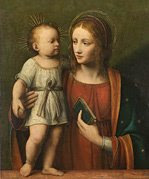Over the years that I have been homeschooling, I have often been challenged about my children's socialization. I used to become defensive and point out that my children are involved with 4-H and sports and drama club and community work and so on and so on. This argument left the non-homeschooler with the impression that my homeschooled children have to be toted all over the city in the family van in order to be with lots and lots of other children who will somehow prevent them from becoming social misfits.
This could not be further from the truth. I have come to appreciate the very real social benefits of homeschooling. I have come to understand that "socialization" is something that my children are learning in the same place where they have been learning to read and write, to say their math facts, and catechism.
The truth is that the moral child is the socialized child. Our children cannot become an integral part of our society without learning basic rules of conduct. Do not steal. Do not lie. Treat others as you would have them treat you. Christian values will teach them how to play and share with others. The Ten Commandments will help them to regulate their behavior so they will be able to fit into society and to rise above it as leaders for the Third Millennium.
When asked how I deal with "diversity," I ask, "what about tolerance?" My children do socialize with a diverse group of children, but that is not the point. The point is that as Christians, my husband and I teach our children to love their neighbor, just as Christ loves all people no matter their age, color, sex, or creed. This is the example that we must put before our children.
Our Catholicism should permeate every part of our lives. Whether dealing with my bank, the neighbors, or my ederly grandmother, my Catholic education is evident. The moral upbringing I received is a vital part of me and my position in society. As home educators we have the awesome opportunity to weave the beauty of the Church's teaching into every subject. This is why I believe that home education can be superior in socializing children.
Friday, April 21, 2006
Subscribe to:
Post Comments (Atom)










 Stumble It!
Stumble It!
3 comments:
This is the height of education, for you are teaching the rules and not the examples. That is dogmatic, and the way real learning takes place. For one does not teach by ONLY giving special examples but by rules - which are also called dogmas.
"It is quaint that people talk of separating dogma from education. Dogma is actually the only thing that cannot be separated from education. It is education. A teacher who is not dogmatic is simply a teacher who is not teaching." [GKC, What's Wrong with the World CW4:162]
In the squabbles about the schools that filled the politics of my youth, there was one plain, and even innocent, assumption that simplified everything. It was assumed that people only differ about religion; or, as it was generally called, "dogma." It never seemed to occur to people that religious teaching must be dogmatic, simply because all
teaching must be dogmatic. The teacher is allowed to say that twice two is four, not because it is less dogmatic, but because it is less disputed. In other words, education is easy when dogma is universal. It only becomes difficult when men are divided about dogmas. [GKC, ILN June 12, 1920, CW32:36]
This is a great post--and so true, Maureen. I couldn't agree more.
Beautifully said, Maureen.
Post a Comment